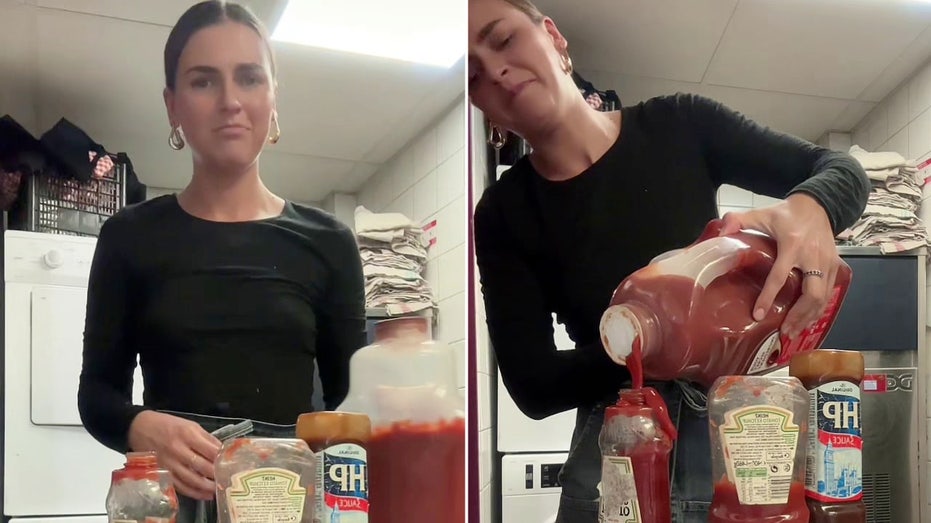
A waitress says she has a ketchup phobia – while a therapist told Fox News Digital that she could be making the situation worse by talking about it.
Alexandriah Govan, 23, of Glasgow, Scotland, recently shared a TikTok video showing herself refilling bottles of ketchup at the restaurant where she worked.
In the video, Govan can be seen gagging and making a face, and the video’s on-screen text reads, “Worst moment of the day.”
MAN SAYS HE GETS HIS FOOD FIX IN HOSPITAL CAFETERIAS: ‘WELL WORTH A VISIT’
The video has been seen more than 8.7 million times and received more than 370,000 “likes” on the app.
Govan noted in the caption that she has a “fear of ketchup.”
This fear originated during her childhood, Govan told What’s the Jam, a United Kingdom news agency, according to Jam Press.
“My sister sprayed a bottle of it on me,” she said. “The smell, even the color, makes me shiver. I hate it so much.”
As a waitress, Govan has to work with ketchup — and she’s had to try to hide her extreme reactions to the condiment, she said.
KETCHUP VS. MUSTARD: WHICH IS ‘BETTER’ FOR YOU? EXPERTS CHIME IN ON THE DEBATE
“I think the vinegary smell puts me off the most,” she said. “When customers use it, the noise of the bottle makes [me feel] even worse.”
Govan’s dislike of condiments is not limited to ketchup, she told What’s the Jam.
“I have a phobia of most of the other sauces – especially mayo,” she said. “Also, the little holes in crumpets freak me out – I can’t eat them.”
VOLKSWAGEN KETCHUP, OFFERED TO US CONSUMERS FOR FIRST TIME, IS QUICKLY SNATCHED UP
Fox News Digital reached out to Govan for additional thoughts.
Many people in the comments section of Govan’s post empathized with her discomfort about ketchup.
“Genuinely thought I was the only person in the world with a fear of ketchup,” one TikTok user wrote.
“[I don’t know] if it’s just me, but I think I am [a] ‘ketchupaphobe,’ because my soul cannot bear when ketchup touches my skin,” another said.
Rachel Goldberg, a Los Angeles-based therapist who works with eating disorder recovery, told Fox News Digital that Govan’s aversion to ketchup may not be a “true phobia.”
WOMAN CREDITS THIS DRINK OF CHOICE TO 105 YEARS OF LIFE: ‘A PERFECT MATCH’
“With a genuine phobia, she might not be able to tolerate working in a restaurant where she will have consistent contact with ketchup,” Goldberg said.
“In her case, she’s able to be near it, though with noticeable discomfort.”
It is not uncommon for food-related fears to be linked to traumatic experiences, Goldberg said, including getting sprayed with a bottle of ketchup as a child.
For more Lifestyle articles, visit www.foxnews.com/lifestyle
“Alternatively, these fears may be rooted in aversions to specific textures, smells or flavors, which can be characteristic of an eating disorder called Avoidant/Restrictive Food Intake Disorder (ARFID),” she said.
Phobias, Goldberg said, “tend to persist because they are reinforced both mentally and behaviorally.”
“By identifying with her ketchup phobia, speaking about it openly and showing physical discomfort near it, she reinforces the fear, keeping it active in her mind as something to avoid,” she said.
If Govan wanted to address her fear of ketchup, Goldberg said, she should either attempt to further expose herself to it or “reframe her perception” of the food in order to make it seem less frightening.
CLICK HERE TO SIGN UP FOR OUR LIFESTYLE NEWSLETTER
“Since she already tolerates some level of exposure, progressing to small tastes or finding ways to incorporate it into foods she enjoys might help,” Goldberg said.
Figuring out exactly what is so repulsive about ketchup could also be helpful, Goldberg said.
“If it’s mainly the smell, there may be limited ways to change her response. However, if it’s linked to past trauma, addressing how that event no longer defines her relationship with this food could be helpful,” she said.
“Ultimately, a lot of this may stem from how deeply she identifies with having a phobia, which can exacerbate the issue,” said Goldberg.
“Reducing that focus and gradually facing the discomfort without wincing, pouring it in a way that expresses fear and telling others about it could help her feel more empowered to handle it.”
A waitress says she has a ketchup phobia – while a therapist told Fox News Digital that she could be making the situation worse by talking about it.
Alexandriah Govan, 23, of Glasgow, Scotland, recently shared a TikTok video showing herself refilling bottles of ketchup at the restaurant where she worked.
In the video, Govan can be seen gagging and making a face, and the video’s on-screen text reads, “Worst moment of the day.”
MAN SAYS HE GETS HIS FOOD FIX IN HOSPITAL CAFETERIAS: ‘WELL WORTH A VISIT’
The video has been seen more than 8.7 million times and received more than 370,000 “likes” on the app.
Govan noted in the caption that she has a “fear of ketchup.”
This fear originated during her childhood, Govan told What’s the Jam, a United Kingdom news agency, according to Jam Press.
“My sister sprayed a bottle of it on me,” she said. “The smell, even the color, makes me shiver. I hate it so much.”
As a waitress, Govan has to work with ketchup — and she’s had to try to hide her extreme reactions to the condiment, she said.
KETCHUP VS. MUSTARD: WHICH IS ‘BETTER’ FOR YOU? EXPERTS CHIME IN ON THE DEBATE
“I think the vinegary smell puts me off the most,” she said. “When customers use it, the noise of the bottle makes [me feel] even worse.”
Govan’s dislike of condiments is not limited to ketchup, she told What’s the Jam.
“I have a phobia of most of the other sauces – especially mayo,” she said. “Also, the little holes in crumpets freak me out – I can’t eat them.”
VOLKSWAGEN KETCHUP, OFFERED TO US CONSUMERS FOR FIRST TIME, IS QUICKLY SNATCHED UP
Fox News Digital reached out to Govan for additional thoughts.
Many people in the comments section of Govan’s post empathized with her discomfort about ketchup.
“Genuinely thought I was the only person in the world with a fear of ketchup,” one TikTok user wrote.
“[I don’t know] if it’s just me, but I think I am [a] ‘ketchupaphobe,’ because my soul cannot bear when ketchup touches my skin,” another said.
Rachel Goldberg, a Los Angeles-based therapist who works with eating disorder recovery, told Fox News Digital that Govan’s aversion to ketchup may not be a “true phobia.”
WOMAN CREDITS THIS DRINK OF CHOICE TO 105 YEARS OF LIFE: ‘A PERFECT MATCH’
“With a genuine phobia, she might not be able to tolerate working in a restaurant where she will have consistent contact with ketchup,” Goldberg said.
“In her case, she’s able to be near it, though with noticeable discomfort.”
It is not uncommon for food-related fears to be linked to traumatic experiences, Goldberg said, including getting sprayed with a bottle of ketchup as a child.
For more Lifestyle articles, visit www.foxnews.com/lifestyle
“Alternatively, these fears may be rooted in aversions to specific textures, smells or flavors, which can be characteristic of an eating disorder called Avoidant/Restrictive Food Intake Disorder (ARFID),” she said.
Phobias, Goldberg said, “tend to persist because they are reinforced both mentally and behaviorally.”
“By identifying with her ketchup phobia, speaking about it openly and showing physical discomfort near it, she reinforces the fear, keeping it active in her mind as something to avoid,” she said.
If Govan wanted to address her fear of ketchup, Goldberg said, she should either attempt to further expose herself to it or “reframe her perception” of the food in order to make it seem less frightening.
CLICK HERE TO SIGN UP FOR OUR LIFESTYLE NEWSLETTER
“Since she already tolerates some level of exposure, progressing to small tastes or finding ways to incorporate it into foods she enjoys might help,” Goldberg said.
Figuring out exactly what is so repulsive about ketchup could also be helpful, Goldberg said.
“If it’s mainly the smell, there may be limited ways to change her response. However, if it’s linked to past trauma, addressing how that event no longer defines her relationship with this food could be helpful,” she said.
“Ultimately, a lot of this may stem from how deeply she identifies with having a phobia, which can exacerbate the issue,” said Goldberg.
“Reducing that focus and gradually facing the discomfort without wincing, pouring it in a way that expresses fear and telling others about it could help her feel more empowered to handle it.”






